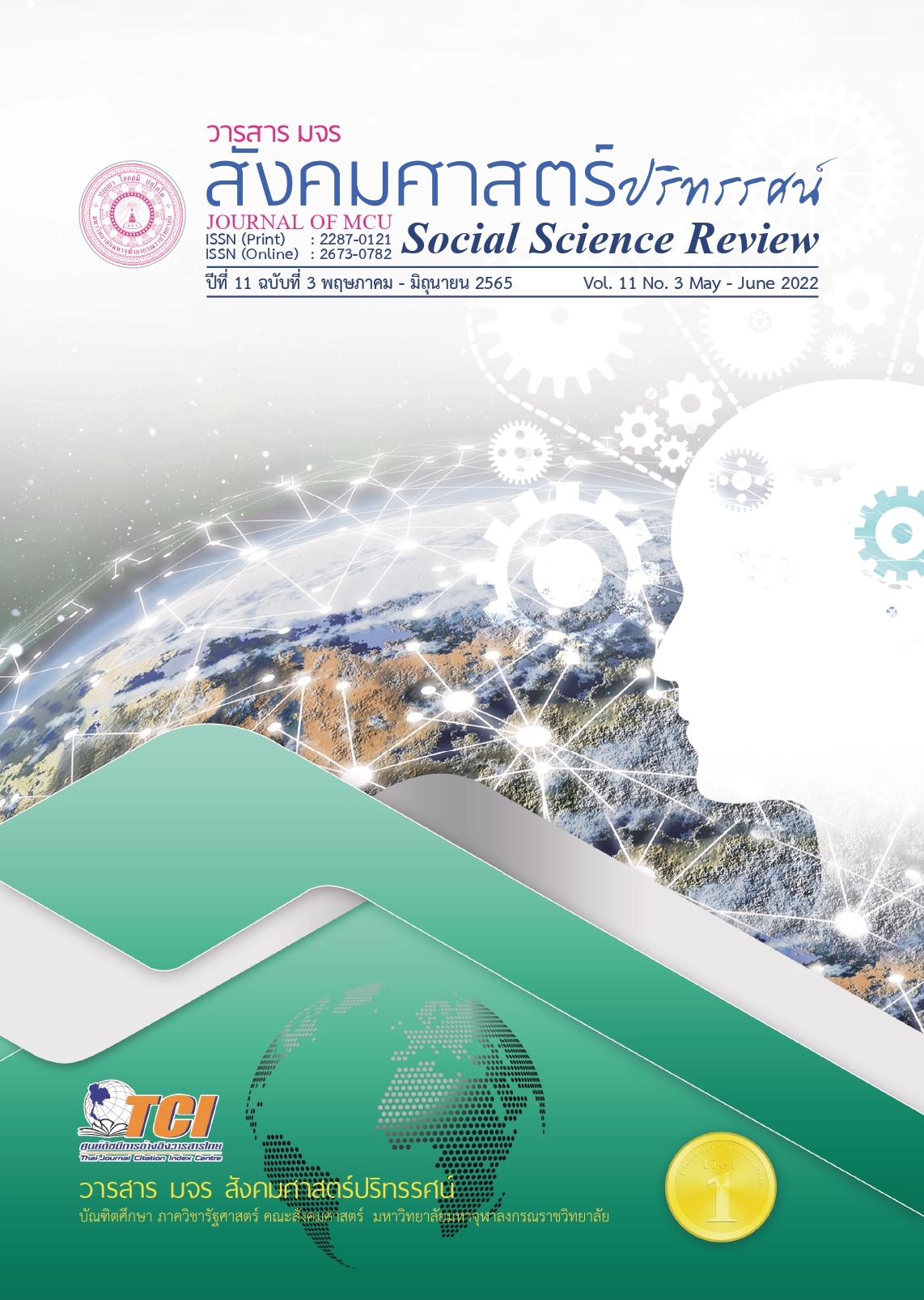โมเดลสมการโครงสร้างพุทธภาวะผู้นำเชิงทศบารมีและนโยบายภาครัฐเพื่อผลสำเร็จการบริหารการเปลี่ยนแปลงของผู้ประกอบการธุรกิจอาหาร
คำสำคัญ:
ภาวะผู้นำเชิงทศบารมี, การบริหารการเปลี่ยนแปลง, ผู้ประกอบการธุรกิจอาหารบทคัดย่อ
บทความวิจัยนี้มีวัตถุประสงค์ เพื่อศึกษาลักษณะของผลสำเร็จ ปัจจัยภาวะผู้นำเชิงทศบารมีและนโยบายภาครัฐ และนำเสนอโมเดลสมการโครงสร้าง เป็นการวิจัยแบบผสานวิธี โดยการวิจัยเชิงปริมาณใช้แบบสอบถามที่มีค่าความเชื่อมั่น 0.977 เก็บข้อมูลจากกลุ่มตัวอย่าง 408 คน วิเคราะห์ข้อมูลโดยใช้สถิติแบบบรรยายและการวิเคราะห์โมเดลสมการโครงสร้าง การวิจัยเชิงคุณภาพใช้การสัมภาษณ์เชิงลึกผู้ให้ข้อมูลสำคัญ 18 รูปหรือคน และการสนทนากลุ่มเฉพาะโดยผู้ทรงคุณวุฒิ 9 คน วิเคราะห์ข้อมูลโดยการวิเคราะห์เนื้อหา
ผลการวิจัยพบว่า 1) ลักษณะผลสำเร็จ มี 5 องค์ประกอบคือ มีการปรับกลยุทธ์องค์กรให้สอดรับกับการเปลี่ยนแปลง สร้างวัฒนธรรมองค์กรใหม่ ปรับโครงสร้างองค์กรให้เหมาะสม มีการสร้างนวัตกรรมและนำเทคโนโลยีใหม่ ๆ มาใช้ และบุคลากรมีความพร้อมต่อการเปลี่ยนแปลง ค่าอิทธิพลที่ส่งผลไปยังองค์ประกอบ 5 ด้านมีค่าระหว่าง 0.76-0.91 2) ปัจจัยที่ส่งผลต่อผลสำเร็จการบริหารการเปลี่ยนแปลงของผู้ประกอบการธุรกิจอาหาร ได้แก่ ทศบารมี ภาวะผู้นำเชิงบารมี และนโยบายภาครัฐด้านอาหาร ผลการวิเคราะห์ค่าสัมประสิทธิ์การพยากรณ์ (R2 ) เท่ากับ 0.542 3) โมเดลสมการโครงสร้างนี้ประกอบด้วยทศบารมีที่มีอิทธิพลโดยตรงและมีอิทธิพลร่วมกับภาวะผู้นำเชิงบารมีและนโยบายภาครัฐด้านอาหารในการส่งผลต่อผลสำเร็จการบริหารการเปลี่ยนแปลงของผู้ประกอบการธุรกิจอาหาร และมีความสอดคล้องกับข้อมูลเชิงประจักษ์ ( c2 = 231.81, df=199, p=.055, GFI = .955, AGFI = .932, RMR= .022, RMSEA = .020)
เอกสารอ้างอิง
กมลชนก ชมพูพันธุ์. (2564). แนวทางการพัฒนาภาวะผู้นำเชิงนวัตกรรมในธุรกิจยุคดิจิทัล. วารสารนวัตกรรมการศึกษาและการวิจัย, 5(1), 148-155.
กมลพร กัลยาณมิตร. (2564). การนำกลยุทธ์การบริหารสู่การปฏิบัติในรูปแบบความปกติใหม่ (New Normal). วารสารสังคมศาสตร์และมานุษยวิทยาเชิงพุทธ, 6(4), 402-422.
กรมโรงงานอุตสาหกรรม. (2563). อุตสาหกรรมแปรรูปอาหารและเครื่องดื่มในประเทศ. สืบค้น 30 กรกฎาคม 2564, จาก https://www.facebook.com/hashtagอุตสาหกรรมแปรรูปอาหารและเครื่องดื่มในประเทศ
จันทนา อุดม และคณะ. (2562). การศึกษาคุณลักษณะและมิติทางวัฒนธรรมองค์การเพื่อยกระดับการเป็นองค์กรแห่งการเรียนรู้เข้าสู่สังคมความรู้. วารสารมหาจุฬานาครทรรศน์, 6(2), 658-677.
ชยพล เพชรพิมล. (2556). ทฤษฎีบารมี (วิทยานิพนธ์ปริญญาปรัชญาดุษฎีบัณฑิต สาขาวิชาการบริหารการศึกษา). กรุงเทพมหานคร: มหาวิทยาลัยศิลปากร.
ธนาคารแห่งประเทศไทย. (2564). EC_XT_008_S2 มูลค่าและปริมาณสินค้าส่งออกจำแนกตามกิจกรรมการผลิต. สืบค้น 30 กรกฎาคม 2564, จาก https://www.bot.or.th/App/BTWS_STAT/statistics/ReportPage.aspx?reportID=747&language=th
นงลักษณ์ วิรัชชัย. (2552). วิจัยและสถิติ: คำถามชวนตอบ. กรุงเทพฯ: ไอคอนพริ้นติ้ง.
นาตยา แท่นนิล. (2555). รูปแบบของกระบวนการนโยบายสาธารณะแบบมีส่วนร่วมในการจัดการเกษตรและอาหารปลอดภัยในจังหวัดสงขลา (วิทยานิพนธ์ปริญญาปรัชญาดุษฎี บัณฑิต สาขาวิชาการจัดการสิ่งแวดล้อม). สงขลา: มหาวิทยาลัยสงขลานครินทร์.
สมเด็จพระเทพรัตนราชสุดา สยามบรมราชกุมารี. (2543). ทศบารมี ในพุทธศาสนาเถรวาท (พิมพ์ครั้งที่ 4). กรุงเทพฯ: มหามกุฏราชวิทยาลัย.
สมบัติ นามบุรี. (2562). โมเดลความสัมพันธ์เชิงสาเหตุแบบพุทธบูรณาการของภาวะผู้นำการเปลี่ยนแปลงในศตวรรษที่ 21 ของผู้บริหารการท่องเที่ยวแห่งประเทศไทย (ดุษฎีนิพนธ์ปริญญาปรัชญาดุษฎีบัณฑิต สาขาวิชารัฐประศาสนศาสตร์). พระนครศรีอยุธยา: มหาวิทยาลัยมหาจุฬาลงกรณราชวิทยาลัย.
สำนักงานคณะกรรมการอาหารแห่งชาติ. (2561). กรอบยุทธศาสตร์การจัดการด้านอาหารของประเทศไทย ฉบับที่ 2 (พ.ศ.2561-2580). กรุงเทพฯ: บริษัท คิวคัมเบอร์ (ประเทศไทย) จำกัด.
อภินันท์ จันตะนี และชมพูนุช ช้างเจริญ. (2563). พระพุทธศาสนากับปรัชญาเศรษฐกิจพอเพียง. วารสารวิทยาการจัดการปริทัศน์, 22(2), 241-250.
อุดม ชัยสุวรรณ และคณะ. (2558). รูปแบบการพัฒนาภาวะผู้นำด้วยบารมี 10 ทัศใน พระพุทธศาสนาเถรวาท. รมยสาร, 13(1), 45-60.
อุไรพรรณ เจนวาณิชยานนท์ และคณะ. (2562). การพัฒนาพื้นที่เพื่อเพิ่มมูลค่าของห่วงโซ่เศรษฐกิจปลาสลิดบางบ่อ ตามยุทธศาสตร์ส่งเสริมสินค้าเกษตรปลอดภัยเป็นมิตรกับสิ่งแวดล้อม จังหวัดสมุทรปราการ. วารสารวิจัยเพื่อการพัฒนาเชิงพื้นที่, 11(2), 93-107.
Hair, J.F. et al. (2010). Multivariate data analysis: A global perspective (7thedition). New Jersey: Pearson Education Inc.
ดาวน์โหลด
เผยแพร่แล้ว
รูปแบบการอ้างอิง
ฉบับ
ประเภทบทความ
สัญญาอนุญาต
ลิขสิทธิ์ (c) 2022 วารสาร มจร สังคมศาสตร์ปริทรรศน์

อนุญาตภายใต้เงื่อนไข Creative Commons Attribution-NonCommercial-NoDerivatives 4.0 International License.
เพื่อให้เป็นไปตามกฎหมายลิขสิทธิ์ ผู้นิพนธ์ทุกท่านต้องลงลายมือชื่อในแบบฟอร์มใบมอบลิขสิทธิ์บทความให้แก่วารสารฯ พร้อมกับบทความต้นฉบับที่ได้แก้ไขครั้งสุดท้าย นอกจากนี้ ผู้นิพนธ์ทุกท่านต้องยืนยันว่าบทความต้นฉบับที่ส่งมาตีพิมพ์นั้น ได้ส่งมาตีพิมพ์เฉพาะในวารสาร มจร สังคมศาสตร์ปริทรรศน์ เพียงแห่งเดียวเท่านั้น หากมีการใช้ภาพหรือตารางหรือเนื้อหาอื่นๆ ของผู้นิพนธ์อื่นที่ปรากฏในสิ่งตีพิมพ์อื่นมาแล้ว ผู้นิพนธ์ต้องขออนุญาตเจ้าของลิขสิทธิ์ก่อน พร้อมทั้งแสดงหนังสือที่ได้รับการยินยอมต่อบรรณาธิการ ก่อนที่บทความจะได้รับการตีพิมพ์ หากไม่เป็นไปตามข้อกำหนดเบื้องต้น ทางวารสารจะถอดบทความของท่านออกโดยไม่มีข้อยกเว้นใดๆ ทั้งสิ้น





